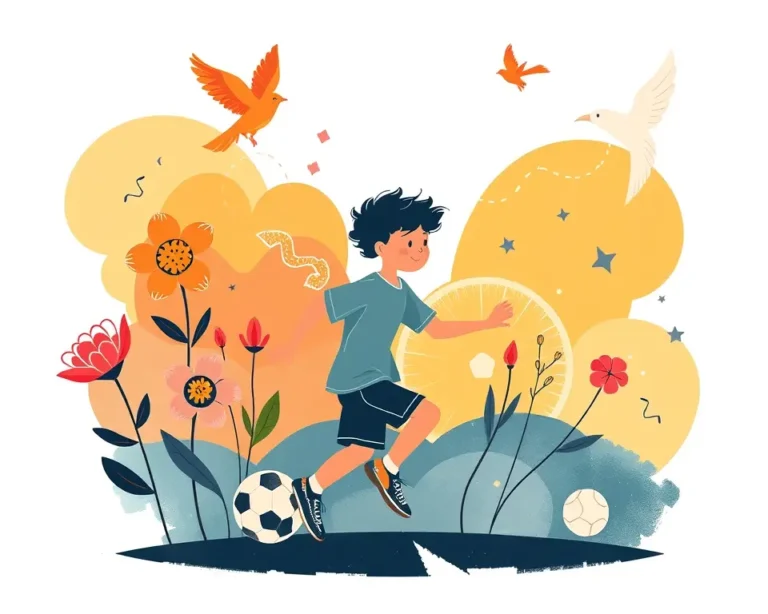In today’s fast-paced world, children face numerous pressures, from academic expectations to social anxieties. Engaging in sports offers a powerful antidote, fostering not only physical health but also robust mental well-being. Let’s explore the multifaceted ways sports participation can significantly enhance a child’s mental health.
Why Sports Matter for Mental Health
Children’s mental health is the foundation for their emotional, social, and cognitive development, shaping their ability to learn, form relationships, and build resilience. Prioritizing mental health from a young age equips them to handle stress, adapt to change, and grow into confident adults. Sports offer more than just physical benefits; they provide emotional strength, social skills, and coping mechanisms that last a lifetime.
Key Mental Health Benefits of Sports
1. Reduces Stress and Anxiety
Sports provide a natural outlet for stress relief. Physical activity increases the production of endorphins, the body’s natural mood elevators, which can help reduce feelings of stress and anxiety. Engaging in sports allows children to focus on the activity at hand rather than their worries, providing a mental break from the pressures of everyday life. Regular exercise also helps children regulate their emotions more effectively. Even a simple activity like walking for 15 minutes a day can help prevent the risk of depression, and playing a sport can reduce this possibility even further.
2. Improves Mood and Self-Esteem
Exercise stimulates the release of endorphins and serotonin, chemicals in the brain that help regulate mood and promote feelings of well-being. Increases in these feel-good chemicals help with anxiety and depression. Sports offer children the opportunity to gain confidence through personal achievement and group success. Successes and achievements in sports can significantly boost a child’s self-esteem. A sense of accomplishment and self-worth can be derived from scoring a goal, making a crucial play, or receiving praise from teammates and coaches. Encouragement and recognition for their efforts, no matter the outcome, can help kids develop a positive self-image.
3. Builds Resilience and Coping Skills
Sports teach kids to handle setbacks, whether it’s losing a game or struggling to improve a skill. Over time, this builds emotional resilience, helping them face challenges in other areas of life. The importance of hard work, practice, and perseverance are often emphasized in the world of sports, offering children a sense of control and personal achievement. Athletics also serve as an outlet for children to cope with frustration, anger, or other difficult emotions. Learning how to manage setbacks, such as losing a game or making a mistake, builds emotional resilience. Sports teach kids that failure is part of the journey and that it’s possible to move forward by learning from their experiences, which provides them with healthy coping mechanisms that are crucial for managing emotions in everyday life.
4. Fosters Social Connection and Friendship
Team sports, in particular, foster a sense of belonging and help kids build lasting friendships. Being part of a team teaches children how to cooperate, communicate, and work towards a common goal. The camaraderie that comes with being part of a sports team provides emotional support that can significantly boost a child’s mental health. The bonds formed on the playing field often turn into friendships that extend outside of practice and games, giving children a supportive network of peers. This sense of belonging is vital for mental well-being, helping children feel connected, valued, and less isolated.
5. Teaches Discipline and Responsibility
Whether your child chooses an independent sport like track or gymnastics or a team sport like basketball or lacrosse, sports demand structure and discipline. Participating in sports helps establish structure and discipline in a child’s life. Regular practices and games promote time management and a sense of responsibility, which can reduce feelings of chaos or overwhelm.
6. Promotes Personal Growth
Every practice or game is an opportunity to learn and improve. Sports foster a growth mindset by encouraging kids to focus on effort and progress rather than just outcomes. Children also learn how to recover after a setback, which helps them learn resilience. Kids also learn to recognize their weaknesses and develop strategies to improve their performance, which leads to a sense of accomplishment.
7. Improves Cognitive Function
Physical activity enhances cognitive abilities in children, improving focus, memory, and executive function—the cognitive processes that enable planning, decision-making, and impulse control. Children who are regularly active tend to perform better in school due to improved focus and cognitive function. Activities like team sports, dance, or problem-solving games further develop multitasking and problem-solving skills. Participating in team sports demands concentration, attention to detail and quick decision-making, allowing children to develop and enhance their cognitive skills, including problem-solving, spatial awareness, and strategic thinking.
8. Encourages Healthy Habits
The stability offered by athletics can help children develop discipline and healthy habits. Participating in sports is a great way to get kids away from screens while also building in physical activity. Sports participation promotes health and wellness not only through childhood but throughout a child’s lifetime. It can also make children more aware of healthy food choices, which is essential for overall health and wellness.
Team vs. Individual Sports
Both individual and team sports can be positive for children.
- Team sports help kids learn to work together to achieve a goal. It gives them a sense of community, where kids learn how to interact with people outside of their families. Team sports develop important social and mental skills in children and teens.
- Individual sports are really helpful because kids can do them at any time, and they don’t need other people in order to engage in them. Examples may include running, cross-country skiing, or water sports. Individual sports tend to encourage responsibility, self-reliance, goal setting, and a higher level of preparation.
Choosing the Right Sport
When choosing a sport for your child, consider their age, personality, interests, and abilities.
- For toddlers and preschoolers (ages 2 to 5 years), sports should be less structured and competitive and focused on having fun and helping your child develop their social skills while being active.
- For kids around 6-9 years, building agility, balance, coordination, and speed and developing and maintaining flexibility should be first and foremost.
- From 9-12 years, sports should begin to be more structured. The focus should be on learning proper warm-up, cool-down, stretching, mobility, and mental aspects.
Instead of choosing sports that emphasize competition, choose sports geared toward having fun and being active. Some good sport activities for children to learn first are activities such as running, tumbling, and swimming because the focus is basic skill development through active play, and these activities do not require organized rules.
What if Your Child Doesn’t Like Sports?
Not every kid wants to participate in sports. If your child has tried several and nothing sticks, view it as an opportunity to identify activities they do enjoy. Children who enjoy art or chess can still learn social skills, leadership, and resilience through these other activities. And they can get the physical activity piece through bike riding, hiking, swimming, or shooting hoops with friends. You may want to encourage your child to explore activities such as bicycling, jogging, hiking, riding bikes, yoga, exercising at the gym, or playing tag with family and friends.
The Long Game: Sports for Lifelong Mental Health
Higher cardiorespiratory fitness and improved motor skills from childhood to adolescence links to fewer depressive symptoms and reduced stress in teenage years. Engaging in sports early in life may have a notably reduced likelihood of being diagnosed with depression or anxiety later in life compared to peers who did not engage in team sports. A long-term commitment to promoting active lifestyles is required to reshape mental health trajectories for future generations.
Making Sports a Positive Experience
To ensure sports participation benefits your child’s mental health:
- Focus on enjoyment and effort, rather than winning.
- Maintain control of your emotions. Remember that you’re modeling how to behave.
- Regularly talk with young athletes about their thoughts and feelings to understand how they are feeling and dealing with pressure.
- Promote hobbies and activities outside of sports to provide mental breaks and enhance self-worth.
- Create a supportive team environment.
- Emphasize good sportsmanship.
By encouraging children to participate in sports, parents and educators can play a pivotal role in fostering their mental health and setting them on a path toward a happier, healthier future.







